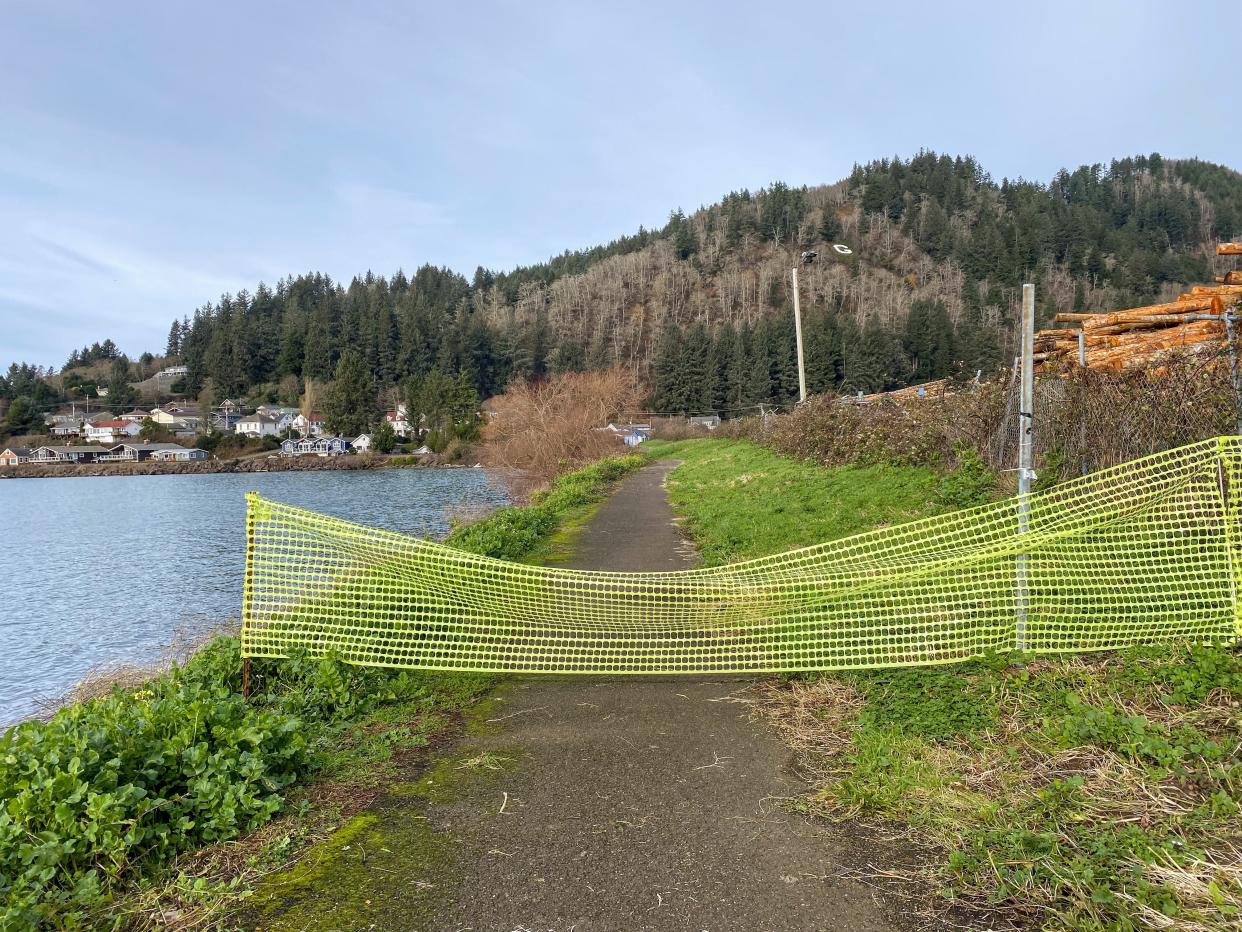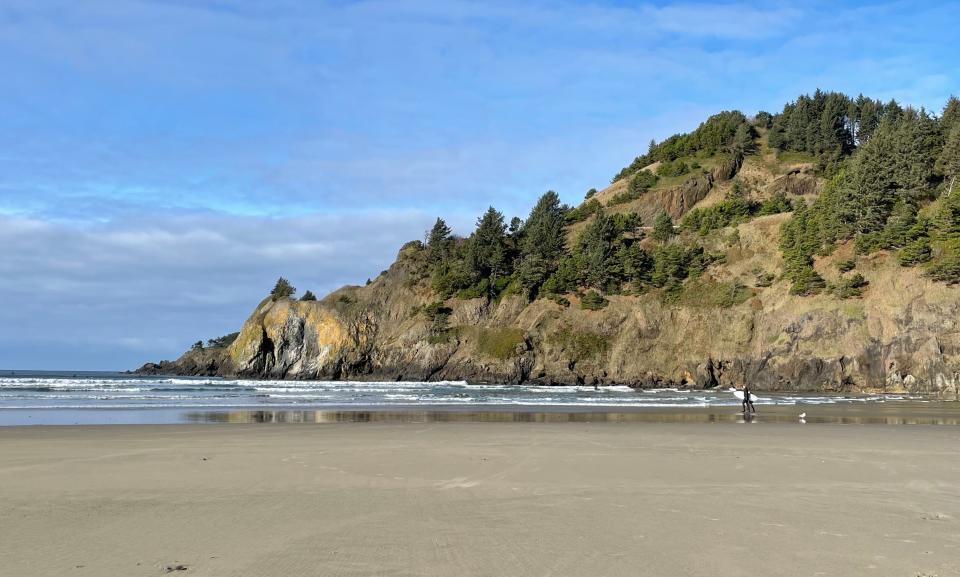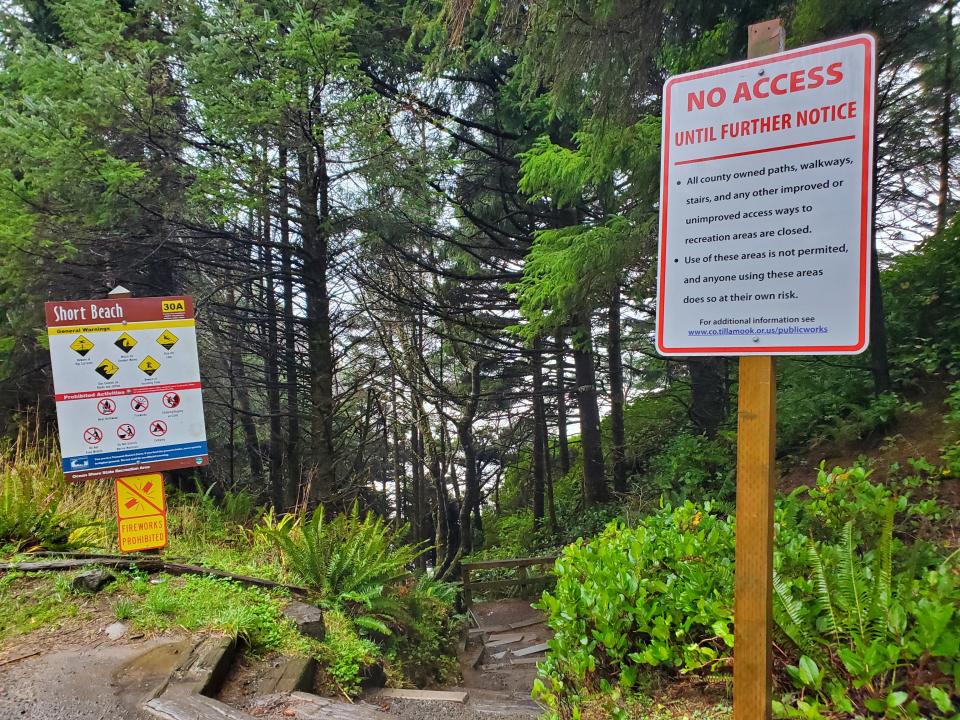'Tough spot': Oregon Coast towns close trails after lawsuit puts legal shield in jeopardy

Michael Saindon didn’t want to close the Harborview Trail, a short and scenic pathway that winds along the bay at the Port of Garibaldi on the Oregon Coast.
The quarter-mile trail does have some issues with erosion and cracks in the pavement, but it’s “still safe and is a beautiful little trail that’s easy to visit off Highway 101,” said Saindon, port manager of Garibaldi.
Ultimately, he decided he didn’t have a choice.
The trail is the latest in a string of pathways shut down on the coast due to a thorny legal issue that could upend how Oregon manages recreation.
In July, Oregon’s Court of Appeals ruled the City of Newport couldn’t use a legal shield known as recreational immunity to dismiss a lawsuit from a woman who sued the city after slipping and breaking her leg while crossing a trail bridge.
The state law has long protected local governments, the state and landowners that open public or private land for recreation from liability if someone gets hurt.
The Oregon Supreme Court refused to hear an appeal in October. In response, CIS Oregon, the largest insurance carrier for Oregon cities and counties, declared the court had “effectively ended recreational immunity” and advised cities to consider closing trails.
The issue is likely to come before the Oregon Legislature in February. Meantime, local governments, mainly on the coast, are unsure how to proceed.
At least five trails in Waldport, Oceanside and the Port of Garibaldi have closed and trail projects have been delayed. Most cities and Oregon's state parks department are taking a wait-and-see approach.
“It has put municipalities like ours in a very tough spot,” Saindon said. “We’re a small port with a small budget. Our costs have already gone through the roof. Honestly, we just couldn’t afford litigation if we can avoid it."
Local tourism officials worry the situation could lead to a “cascading closure of trails that have the real potential to cripple the outdoor recreation economy, here and statewide,” said Dan Haag, director of trails and outdoor recreation for Tillamook Coast Visitors Association.
The Oregon Trial Lawyers Association, which advocates for injured individuals, has called the closures "an overreaction" ginned up by insurance companies that don't want to pay out claims.
The lawsuit against the City of Newport
In January 2019, Nicole Fields, a friend and their dogs followed the Ocean to Bay Trail in Newport to reach Agate Beach. After spending a couple of hours on the beach, they walked back on the same trail and came to a wooden bridge.
“As plaintiff put her foot down on it, she noticed that the bridge was slippery,” the Oregon Court of Appeals wrote. “Plaintiff immediately warned her friend that the bridge was slippery, and then promptly fell. Her left leg was badly broken beneath the knee.”

Fields sued the City of Newport, claiming the bridge was “unreasonably hazardous” because it used “materials that become unusually slippery, but do not appear slippery.” The lawsuit also said the city had failed to apply anti-slip measures to the bridge surface and hadn’t provided warning of the conditions, according to court documents.
“As a result of defendants’ negligence, plaintiff was caused physical pain, anguish, and suffering,” the lawsuit said. Fields asked for upward of $345,000 in economic and non-economic damages.
Newport’s lawyers responded that the city was immune from the lawsuit because Fields was using the trail for a recreational purpose and the city was protected under recreational immunity. Lincoln County Circuit Court agreed and granted summary judgment in favor of the city.
Court of Appeals debates walking versus hiking, reverses decision
Fields appealed the decision, arguing her purpose on the trail was not principally recreational. She noted walking and dog walking are not expressly included in the recreational immunity statute, and while hiking is included, “using the trail to get to the beach is not the same as hiking on the trail.”
The court debated the definition of walking versus hiking and ultimately decided “there remains an issue of material fact as to whether plaintiff’s principal purpose in walking on the city’s trail was recreational or whether it was simply to go to and from the beach.”
Fields also argued Oregon law only extends recreational immunity to unimproved access trails, and because the city improved, designed, and maintained the Ocean to Bay Trail for the purpose of accessing the beach, the city is not entitled to recreational immunity.
The appeals court ruled in Fields' favor, writing “because the trail on which plaintiff fell was an improved trail … the city’s entitlement to immunity depends on the resolution of those factual issues by a jury."
The case was sent back to Lincoln County to likely go before a jury.
Oregon Supreme Court refuses to hear Newport's appeal
Newport, joined by groups such as the League of Oregon Cities, asked the Oregon Supreme Court to overrule the decision and restore recreational immunity.
If the ruling was allowed to stand, they argued, “landowners must decide if making their land available for recreational purposes is worth the risk of effectively losing access to the immunity by having to litigate through trial whatever subjective beliefs an injured plaintiff asserts their principal purpose was.”
The court in October declined to review the decision.
Insurance company recommends cities close trails
In the wake of the appeals court ruling, CIS Oregon issued the following recommendations:
1. Improved trails that are used to access a recreational area should be closed. This especially includes trails, walkways and stairs used to access bodies of water, such as the ocean, lakes, rivers, streams and reservoirs.
2. Consider closing unimproved trails, because the subjective intent of the user can now nullify recreational immunity, which means if someone is injured on an unimproved trail, the city or county may find itself facing a costly jury trial to determine the injured person’s intent in using the trail.
Cities grapple with whether to close trails

The appellate court decision and advice from CIS has roiled cities and counties up and down the Oregon Coast.
“They’re very concerned about the court ruling,” said Erin Good, spokeswoman for the Association of Oregon Counties. “Currently, each county is in the process of deciding how they will balance the liability risk against the community impact of closing trails.”
The majority of cities, including Newport, have kept trails open for now.
“The way the court interpreted recreational immunity is potentially problematic, but we’re not taking any action to close trails until we get further clarification,” Newport City Manager Spencer Nebel said.
Oregon’s state parks department also has kept trails open for now.
Some cities have started closing trails and have delayed plans for future ones.
Waldport closed the John Maré Woodland Trail and said it wouldn’t reopen the beach access Waziyata Trail, City Manager Dann Cutter told the YachatsNews. He said they’d revisit the issue in the spring.
“The minor inconvenience of closing these trails, conveniently in the rainy winter season, is a minor price to safeguard the city’s potential exposure to liability,” Cutter told the online news site.
Tillamook County closed the Short Beach and Tire trails in Oceanside. County Commissioner Erin Skaar said they chose to close those pathways because they were in rough condition. She also said the county would deny, or at least delay, a decision over building a new trail at Cape Meares.
Skaar said if the issue is not resolved in the coming legislative session, the county will have to scrutinize other trails on county land.
“If there isn’t a fix — and if recreational immunity just doesn’t exist — that would be a huge paradigm shift for the coast,” Skaar said. “We’d have to take a hard look at all county property and figure out, ‘What might we have to close?’
“A great example is a place like Bayocean Spit, where the county owns a majority of the land and people recreate on it every day. But there’s no way we could maintain every pathway out there. It’s just not possible.”
A concern for the cities isn’t just getting sued, but that additional lawsuits could cause insurance costs to skyrocket or result in losing coverage for recreational activities. At the same time, closing trails would mean losing tourism dollars and a loss of quality of life.
“There is no way to quantify how devastating these closures would be, not only in terms of local economies, but on the health and well-being of residents who count on access to trails and beaches for everything from stress relief to exercise,” said Haag, with the Tillamook Coast Visitors Association.
‘Chicken Little’ tactics?
Arthur Towers, political director of the Oregon Trial Lawyers Association, said concern over the ruling and closing down trails was an overreaction, stirred up by insurance companies because they don’t want to pay out money to injured people who need the funds for medical care.
“They are overreacting in a big way,” Towers said. “This is a ‘Chicken Little the sky is falling’ tactic that we’ve seen every time an insurance company doesn’t want to take responsibility for paying out claims to people who really need it.”
Court decisions in the past over recreational immunity and liability waivers at ski areas haven’t brought an avalanche of lawsuits that shut down recreation, he said.
The Fields ruling simply puts the question in the hands of a jury to decide, rather than having it summarily dismissed.
“All the appeals court has done is send it back to the lower court so that a jury can hear the facts of the case and make a decision,” Towers said. “They could decide the city was negligent or not, but I think we should trust juries, trust the people of the Oregon Coast to make those decisions.”
‘This is going to trigger a fight’
The future of recreational immunity is almost certainly headed to the Oregon Legislature in February.
Scott Winkels, a lobbyist for the League of Oregon Cities, said the group is working on language for legislation that would “correct the current challenge with the court ruling” and “restore recreational immunity to what we’ve long understood it to mean.”
“This state has long had a policy that if you open up your land for free, you get immunity,” Winkels said. “As a state, we recognize that there is risk to recreation and when you open your land, for free, you should be protected.”
The problem with eliminating or weakening recreational immunity, and having more cases reach juries, is that litigation is extremely expensive, he said.
“Cities are already in a dire financial situation, and if they’re going to have to buy additional insurance to cover these claims, that’s not cheap,” Winkels said.
The legislation will likely face opposition from the Oregon Trial Lawyers Association, which helped kill a bill in the 2023 session on restoring the legal power of liability waivers for recreation businesses like ski areas.
Towers said he is gearing up.
“When this decision came down last summer, I thought ‘Oh, this is going to trigger a fight,’” Towers said.
Back on the Oregon Coast, city and county officials will also be watching this coming session closely to determine the fate of their trails.
Zach Urness has been an outdoors reporter in Oregon for 15 years and is host of the Explore Oregon Podcast. Urness is the author of “Best Hikes with Kids: Oregon” and “Hiking Southern Oregon.” He can be reached at zurness@StatesmanJournal.com or (503) 399-6801. Find him on Twitter at @ZachsORoutdoors.
This article originally appeared on Salem Statesman Journal: Oregon Coast trails close after lawsuit puts legal shield in jeopardy

